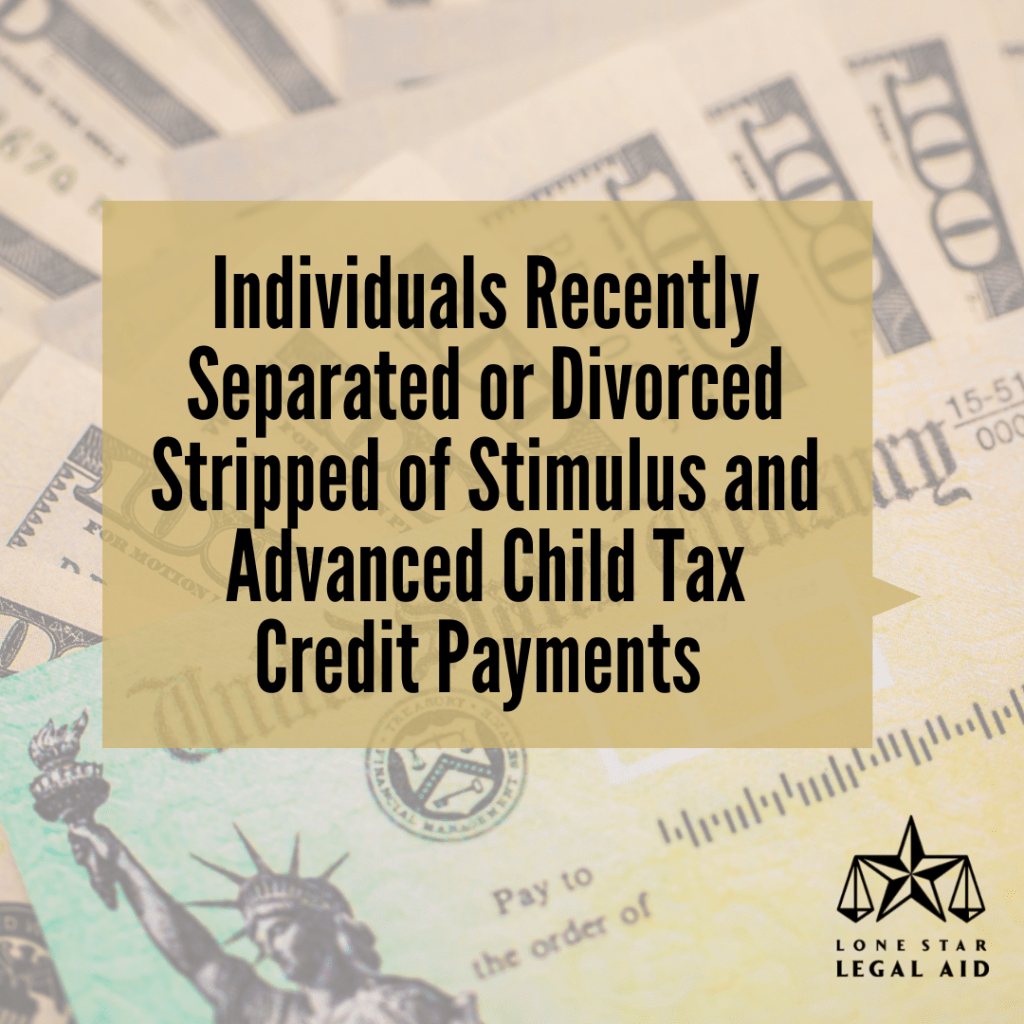July 13, 2021 by Clarissa Ayala
Individuals Recently Separated or Divorced Stripped of Stimulus and Advanced Child Tax Credit Payments
Topic
News
Some people who are separated or have recently been divorced have been facing unique issues accessing Covid-19 recovery aid being provided through the IRS, namely the economic impact/stimulus payments and the soon-to-be deposited advance child tax credit payments.
The first two Economic Impact payments were distributed based on information from 2018 to 2019 returns, and the third payment was calculated using 2019 or 2020 returns. Due to this, there is a strong likelihood that an estranged or ex-spouse could get the payments intended for their spouse. As there is no requirement to pay back the stimulus, there is no incentive to give their ex-partner their due share.
According to the IRS, once a stimulus payment has been issued in these cases, the IRS will not issue another, and one should pursue their ex in court for their share of the stimulus payment(s). Unfortunately, this is not a realistic solution for many legal aid clients. Suing can be difficult without the ability to hire an attorney, and is likely traumatic for an abused spouse.
“These payments have emerged as another way of financial control over domestic violence survivors,” says Karyna Lopez, Managing Attorney of LSLA’s Low Income Taxpayer Clinic. She continued, “we have noticed these issues since the first economic impact payment was distributed in March 2020. While there are IRS procedures to handle cases for innocent spouses, where one spouse incurs tax debt that it would be unfair to hold the other spouse jointly responsible for, there is no clear method to fix these cases for clients who desperately need this money.”
The advance Child Tax Credits going out later this month are treated differently. Those who receive child tax credit payments they are not entitled to will have to pay them back. Though these amounts are an advance on credits for the 2021 tax year, which will be filed next year in 2022, they are based on 2020 returns. Therefore, the information may be out of date, causing a custodial parent with children to be unable to receive payments.
If you or someone you know has not filed their taxes and are not required by law, the IRS’ Child Tax Credit Non-filer Sign-up tool https://www.irs.gov/credits-deductions/child-tax-credit-non-filer-sign-up-tool can be used to provide information to receive the advance child tax credit payments. To check the status of your payments or bank information, you can use the Child Tax Credit Update Portal at https://www.irs.gov/credits-deductions/child-tax-credit-update-portal. Please note if the child tax credit payments are scheduled to go to someone else, the tool will deny your submission, and you can recover the full credit when you file your tax return in 2022.
Visit our Low Income Taxpayer Clinic page for information about our services. If you or someone you know needs legal help, you can apply for free legal services with us by visiting http://www.lonestarlegal.org or calling 1-800-733-8394.
Lone Star Legal Aid is a 501(c)(3) nonprofit law firm focused on advocacy for low-income and underserved populations. Lone Star Legal Aid serves the millions of people at 125% of federal poverty guidelines that reside in 72 counties in the eastern and Gulf Coast regions of Texas, and 4 counties of southwest Arkansas. Lone Star Legal Aid focuses its resources on maintaining, enhancing, and protecting income and economic stability; preserving housing; improving outcomes for children; establishing and sustaining family safety and stability, health and well‐being; and assisting populations with special vulnerabilities, like those who have disabilities, or who are elderly, homeless, or have limited English language skills. To learn more about Lone Star Legal Aid, visit our website at www.lonestarlegal.org.
Media Contact: media@lonestarlegal.org
